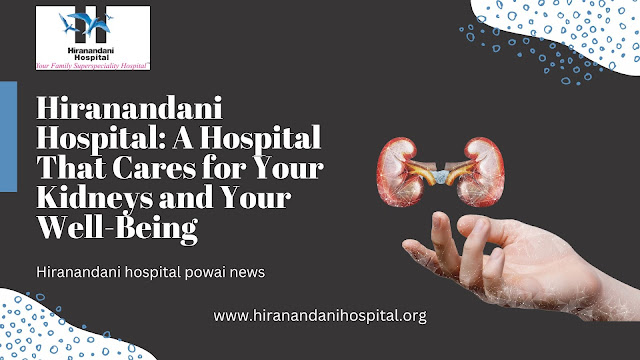Kidney stones, those tiny but excruciatingly
painful mineral and salt deposits that can form in your kidneys, are no one's
idea of a good time. The good news is that you have the power to reduce your
risk of encountering these troublesome little crystals. I'm Dr. Sujit
Chatterjee, CEO of Hiranandani
Hospital in Powai news, Mumbai, and I'm here to walk you through the
strategies and tips for preventing kidney stones.
Understanding Kidney
Stones
Before we dive into prevention, it's essential
to understand what kidney stones are and how they develop. These solid
formations can vary in size and composition but are consistently known for the
discomfort they cause when they obstruct the urinary tract. Kidney stones form
when specific minerals and salts in your urine accumulate and crystalize.
Knowing the enemy is the first step toward defeating it.
The Power of Hydration
One of the most potent tools in preventing
kidney stones is staying well-hydrated. Dehydration can lead to concentrated
urine, which increases the chances of mineral and salt crystallization. Here's
how you can use hydration to your advantage:
- Aim to drink an adequate amount of fluids
daily, with water being your primary choice. It helps dilute minerals in the
urine, reducing the risk of stone formation.
- If you live in a hot climate or engage in
physical activities, you may need to increase your fluid intake to compensate
for fluid loss through sweating.
- Make it a habit to sip water throughout the
day rather than waiting until you're thirsty.
Dietary Choices Matter
Your dietary choices
play a pivotal role in the formation of kidney stones. Here's how you can make
informed decisions:
- Embrace Fruits and Vegetables: These natural
foods are rich in essential nutrients and antioxidants that promote overall
health and support kidney function. They also contain plenty of water, which
aids in maintaining urine dilution.
- Limit High-Oxalate Foods: Some foods, like
spinach, beetroot, and almonds, are high in oxalate, a substance that can contribute
to certain types of kidney stones. While they are nutritious, it's advisable to
consume them in moderation.
- Moderate Animal Protein: Excessive animal
protein, found in meat, poultry, and fish, can increase the risk of kidney
stone formation. Consider incorporating plant-based protein sources like beans,
lentils, and tofu into your diet.
Managing Sodium Intake
Sodium, a component of salt, can influence your
risk of developing kidney stones. High-sodium diets can result in increased
calcium excretion in the urine, which is a risk factor for stone formation. To
manage your sodium intake:
- Read Food Labels: Pay attention to sodium
content when purchasing packaged foods. Many processed foods contain hidden
salt.
- Use Herbs and Spices: Instead of relying on
salt for flavor, explore the world of herbs and spices. They can add depth and
taste to your dishes without the sodium.
Moderating Protein
Consumption
Protein is an essential
part of a balanced diet, but excessive intake, especially from animal sources,
can contribute to kidney stone formation. To strike a balance:
- Choose Lean Proteins: Opt for lean cuts of
meat and remove visible fat.
- Balance Your Diet: Ensure your protein intake
is balanced with other essential nutrients, like fiber from fruits and
vegetables.
Conclusion: Taking
Control of Your Kidney Health
As we conclude our exploration of kidney stone
prevention, remember that your health is ultimately in your hands. By adopting
these practical strategies, you can significantly reduce your risk of kidney
stones. At Hiranandani
Hospital Kidney, we prioritize comprehensive healthcare, which includes
equipping you with the knowledge to protect your kidney health. Hydration,
dietary choices, and moderation in sodium and protein consumption are your
allies in this journey towards a life free from the discomfort of kidney
stones. Your health is your most valuable asset, and with the right guidance,
you can safeguard it for a brighter, pain-free future.



Comments
Post a Comment